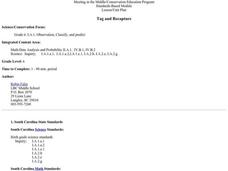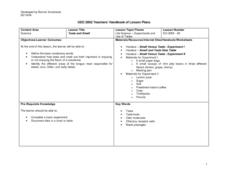Curated OER
Probability
Second graders experiment with probability. For this probability lesson, 2nd graders pick colored beans from a bag to find the chance of getting different colors. They make fair and unfair spinners and record the data after spinning...
Curated OER
Is This Really Okay for Me? A Public Health Statistical Analysis
Future public health consultants are asked in a letter to help determine if a fictitious drug is causing birth defects in a population. They perform a simulation using beans and probability calculations to come to a conclusion. Note that...
Alabama Learning Exchange
Jelly Beans Add Up
Students explore counting, sorting, and graphing skills. In this data analysis lesson plan, students sort jelly beans by color, count the jelly beans, and create a bar graph of the jelly beans according to color.
Curated OER
"Eggs-ploring" Math with Jellybeans
Learners work in pairs with a small bag of jellybeans to estimate the number of candies in their bags and then figure out how many groups of 10 jellybeans are contained in their bags. They then graph the information using a pictograph or...
Curated OER
Probability or Ability?
Students fill in a probability chart while attempting to catch candy with their non-dominant hands. They replicate the activity with a coin.
EngageNY
Sampling Variability in the Sample Proportion (part 1)
Increase your sample and increase your accuracy! Scholars complete an activity that compares sample size to variability in results. Learners realize that the greater the sample size, the smaller the range in the distribution of sample...
Curated OER
Tag and Recapture
Sixth graders participate in an activity in which colored jelly beans represent fish in a lake--10 green jellybeans per "lake" representing tagged fish. They draw from the beans (fish) and record the number of tagged fish they draw...
Curated OER
A Seed Grows
Second graders begin the lesson by planting their own bean seed. Individually, they make predictions about how many leaves and roots their plant might grow and each day record their observations. They graph the results of the length of...
Curated OER
Throw Everything
Pupils throw objects overhand into containers in the center of the playing area.
Curated OER
Nim: A Game Played All Over the World
Learners participate in a European subtraction game. In this subtraction lesson, students use pebbles to demonstrate different subtraction strategies. The learners use a deduction strategy to be the first one left with no pebbles.
Curated OER
Taste and Smell
High schoolers experiment with sense of smell, and how it relates to sense of taste.
Curated OER
First Place Foods
First graders identify healthy foods. In this nutrition lesson, 1st graders create a Venn diagram to compare and contrast healthy foods. Students place foods in the proper circle.
Curated OER
Date a Rock!
High schoolers figure the number of half-lives since the sample solidified, and therefore the "age" of the sample rocks.
Alabama Learning Exchange
Alex: Jelly Beans Add Up
The lesson will explore counting, sorting, and graphing skills. The lesson provides students an exciting and fun way of exploring and internalizing graphing, sorting, and counting skills. Realistically, the students will discover what...















